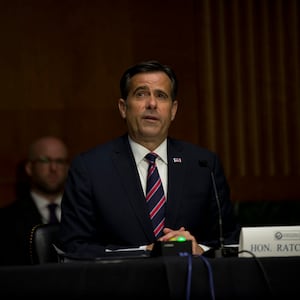The Iranians trolls who disguised themselves as Proud Boys fans in an attempt to intimidate voters were linked to a disinformation campaign that targeted Israel and Saudi Arabia, according to Facebook.
In a press conference on Tuesday, Facebook announced that it took down a handful of accounts on Facebook and Instagram after a tip from the FBI about Iranian election-related meddling. The tip followed an announcement by FBI Director Christopher Wray and Director of National Intelligence John Ratcliffe that U.S. intelligence had found Iran was behind emails sent to Democratic voters in Florida and Alaska threatening that “You will vote for Trump on Election Day or we will come after you.”
The company says an initial investigation following the tipoff led it to a single account created in October 2020 that “attempted to seed false claims and unsubstantiated election related threats” as part of an election influence plot that relied mostly on email.
Further investigation by Facebook led the company to discover more accounts and pages that were dormant but had been used to spread false claims about Israel and Saudi Arabia. Among the more sensational claims pushed by the network was a false claim about a fake massacre at the annual Eurovision music contest hosted in Israel in 2019.
Some of the accounts sought to reach out to reporters, including journalists at an outlet focused on news about Afghanistan, according to the company.
The network—a small one relative to others suspended by Facebook, with just 12 Facebook accounts, 6 Facebook pages, and 11 Instagram accounts with a combined 800 followers—was run by “individuals with links to the Iranian government,” according to Nathan Gleicher, Facebook’s head of security. The dormant accounts uncovered by Facebook researchers were also linked to a previous set of accounts the company suspended in April 2019 and attributed to Iran’s state news company, Islamic Republic of Iran Broadcasting, Gleicher said.
Last week, the Treasury Department sanctioned IUVM and IRTVU—two Iranian fake news umbrella organizations—and the Bayan Rasaneh Gostar Institute, which officials said was an Islamic Revolutionary Guard Corps front company “prepared to execute a series of influence operations directed at the U.S. populace ahead of the presidential election.”
Facebook also announced that it had suspended a larger network it attributed to “individuals” in Mexico that had recycled old memes from the Russian Internet Research Agency (IRA) troll farm responsible for much of Moscow’s meddling in the 2016 election.
Gleicher, however, cautioned that the network’s use of old IRA memes “by itself is a limited indicator of who is behind this" and does not necessarily point to Russian involvement.
The Mexico-based network was also small at just two Facebook pages and 22 Instagram accounts and racked up nearly 55,000 followers. The network operators used fake accounts that “posed as Americans supporting various social and political causes and tried to contact other people to amplify this operation’s content,” according to the company. When reaching out to other Facebook users, the fake accounts claimed to be working on behalf of a fictitious Polish social media firm.
Memes and content shared by the suspended accounts touched on hot button political issues like race and gender but also pushed more generic content on topics like religion and dog memes.
In addition, Facebook also announced that it had suspended disinformation networks operated out of Myanmar which targeted domestic Burmese audiences.
Officials from Myanmar’s military ran a vast network of coordinated inauthentic activity on Facebook that the company suspended in 2018. Until its suspension, the network was used to incite violence against Myanmar’s Rohingya ethnic minority, which U.N. officials have labeled a genocide and ethnic cleansing.







